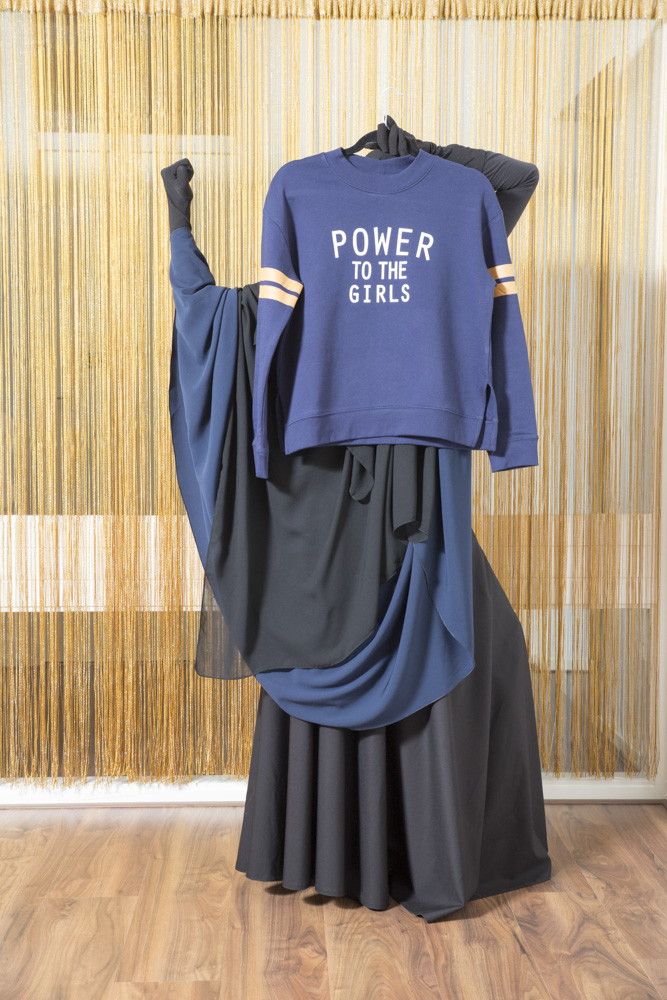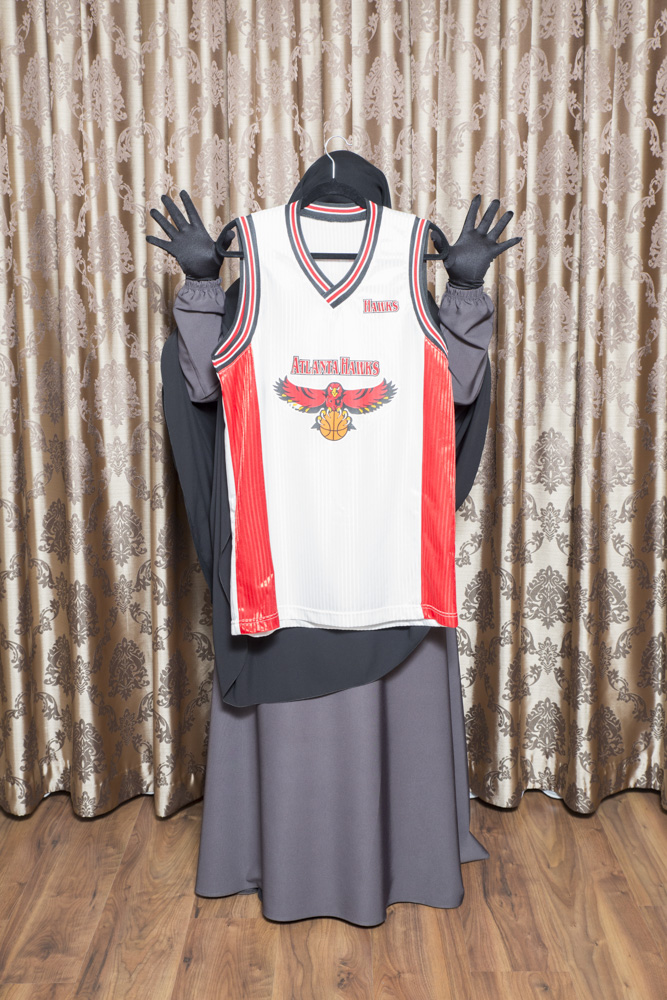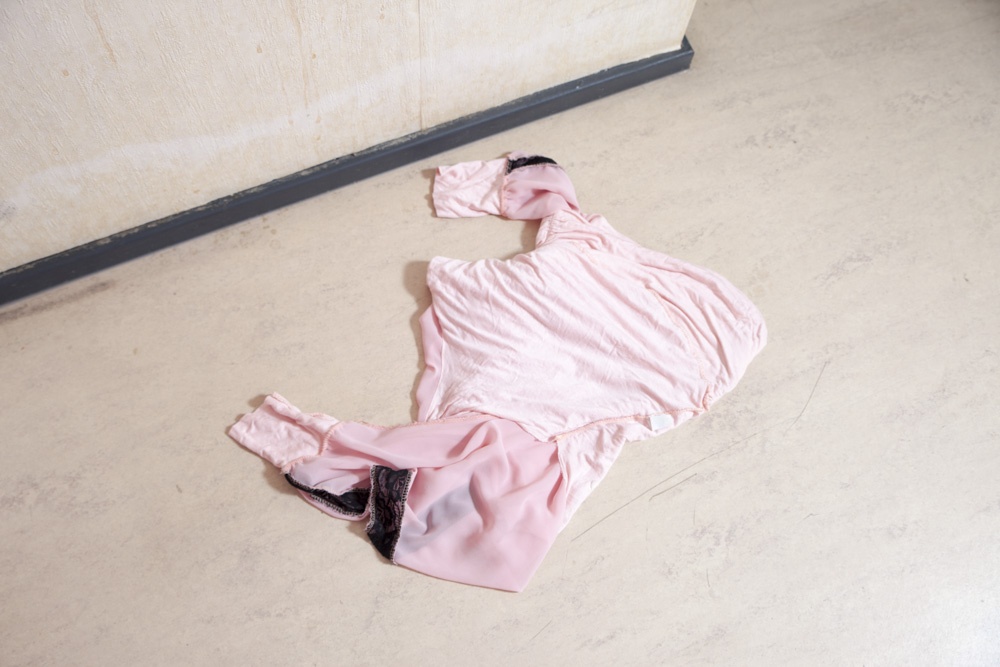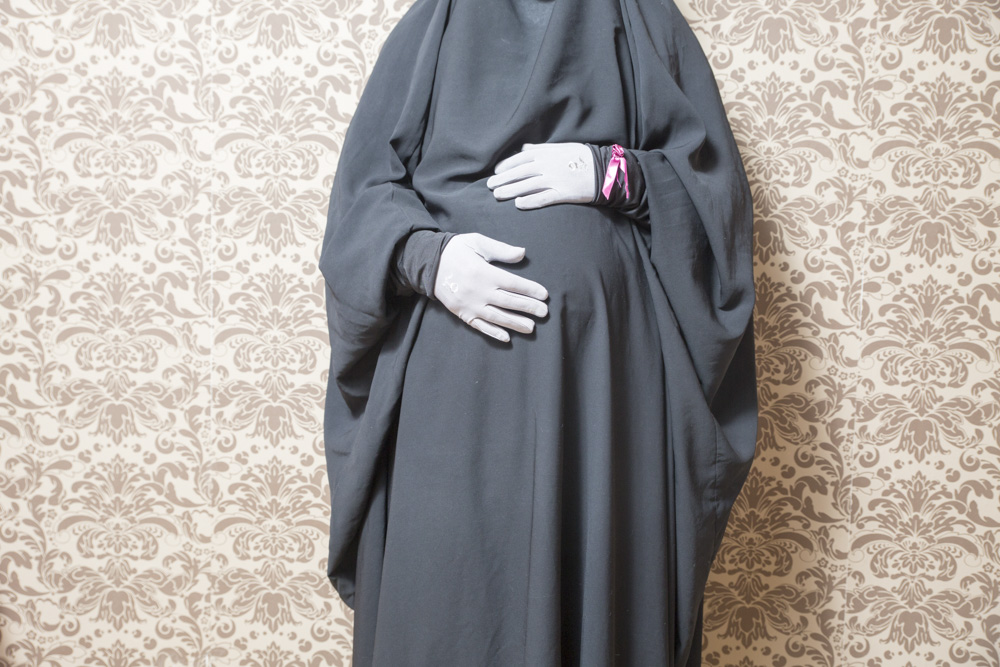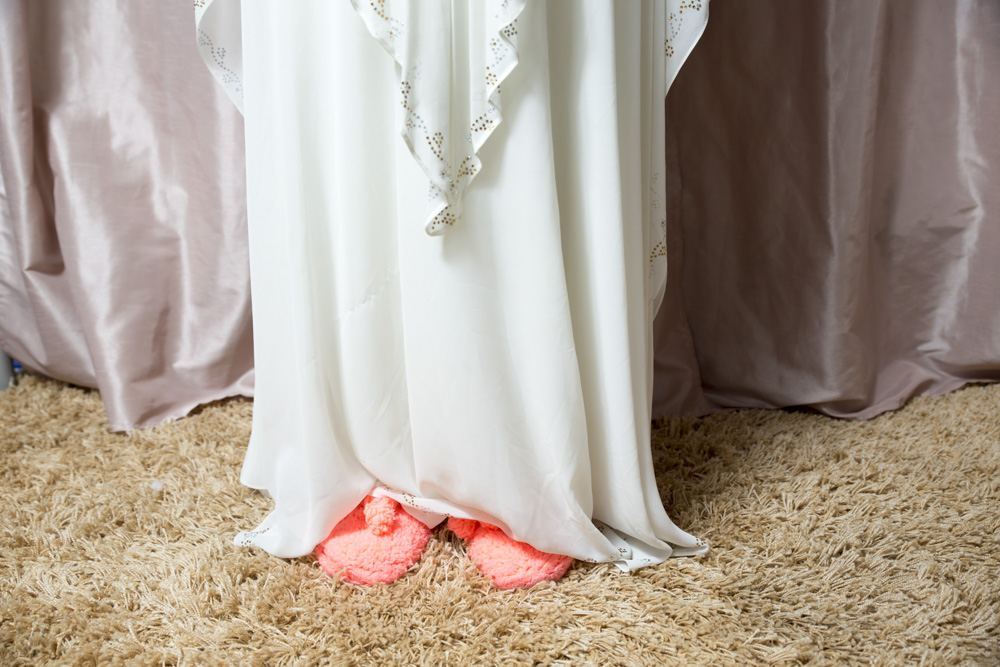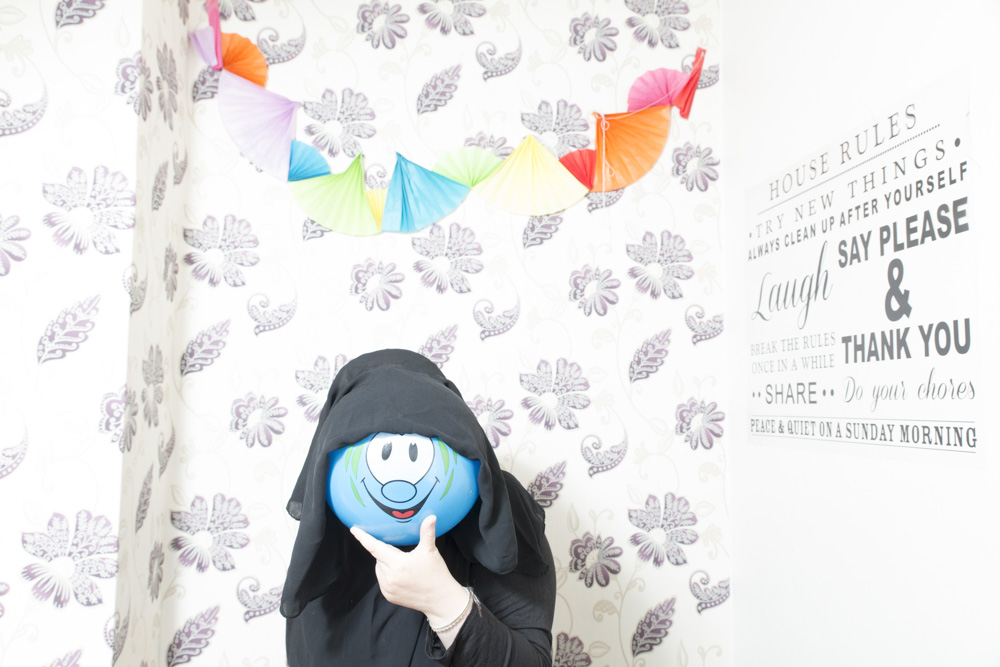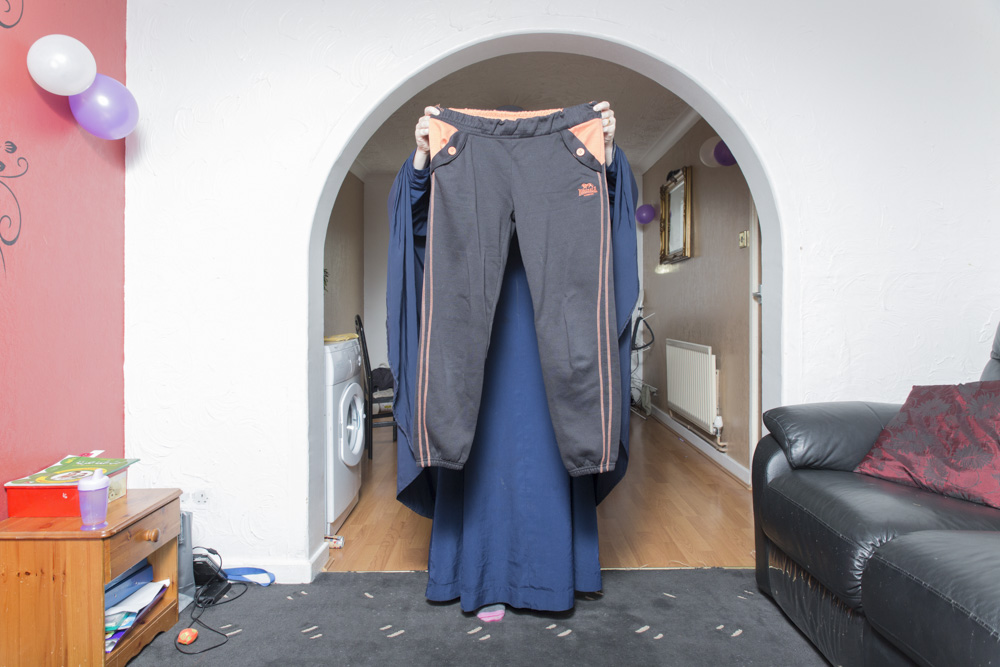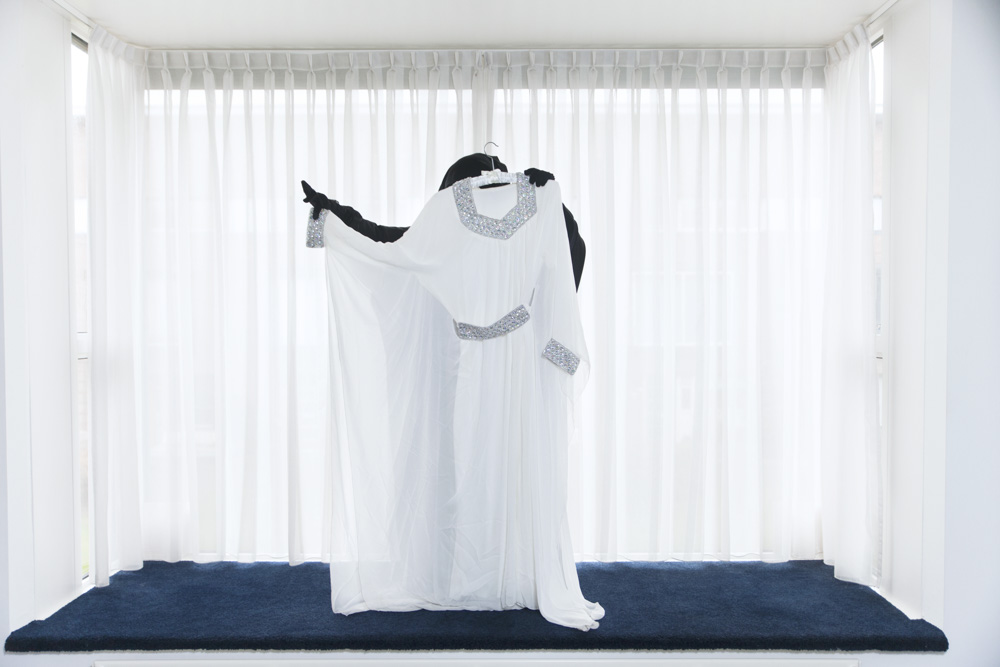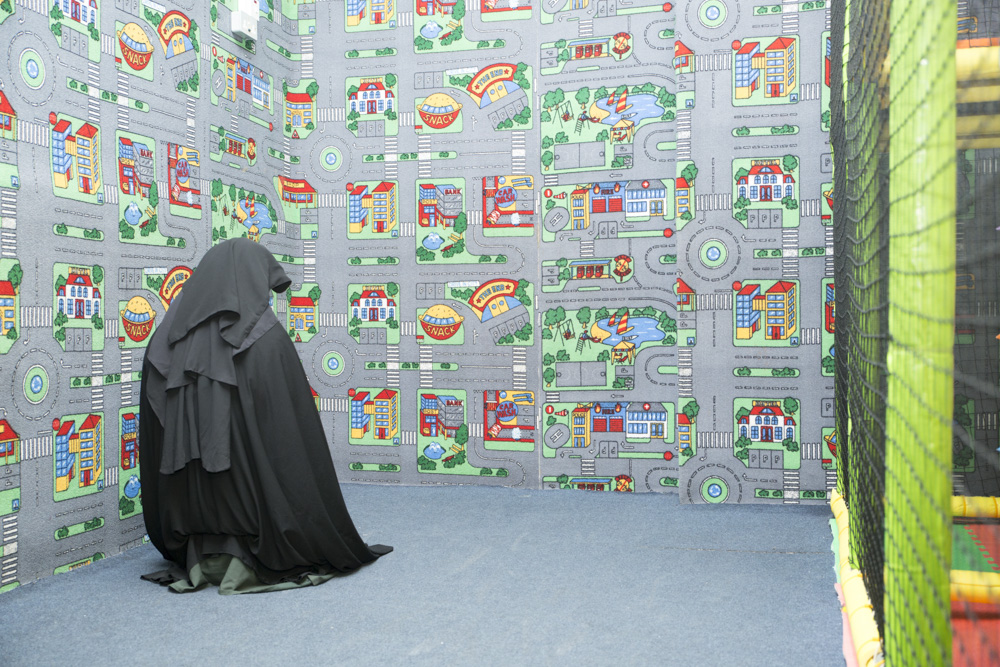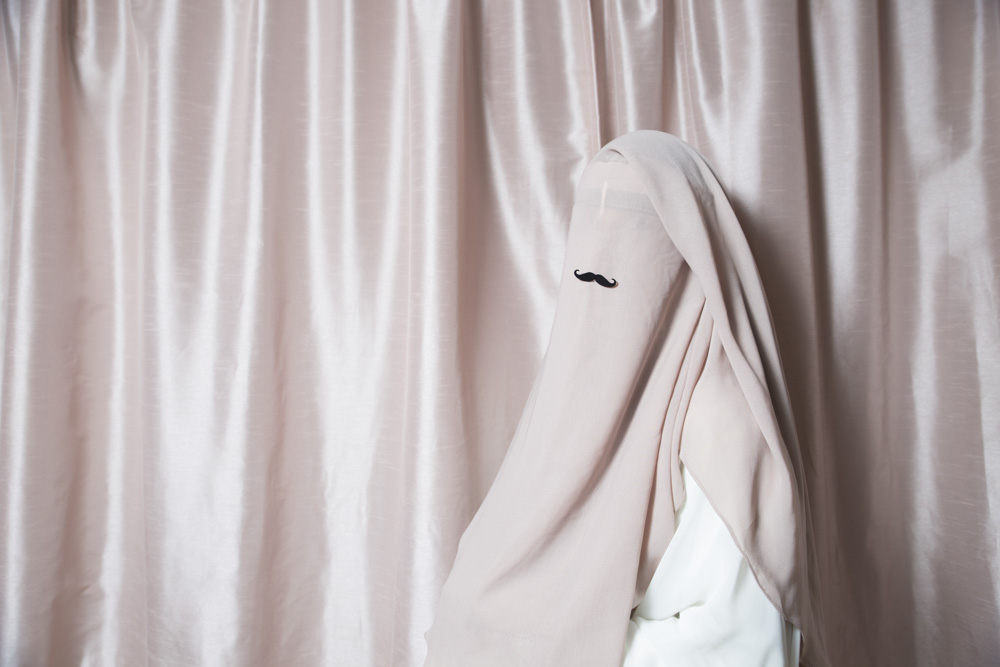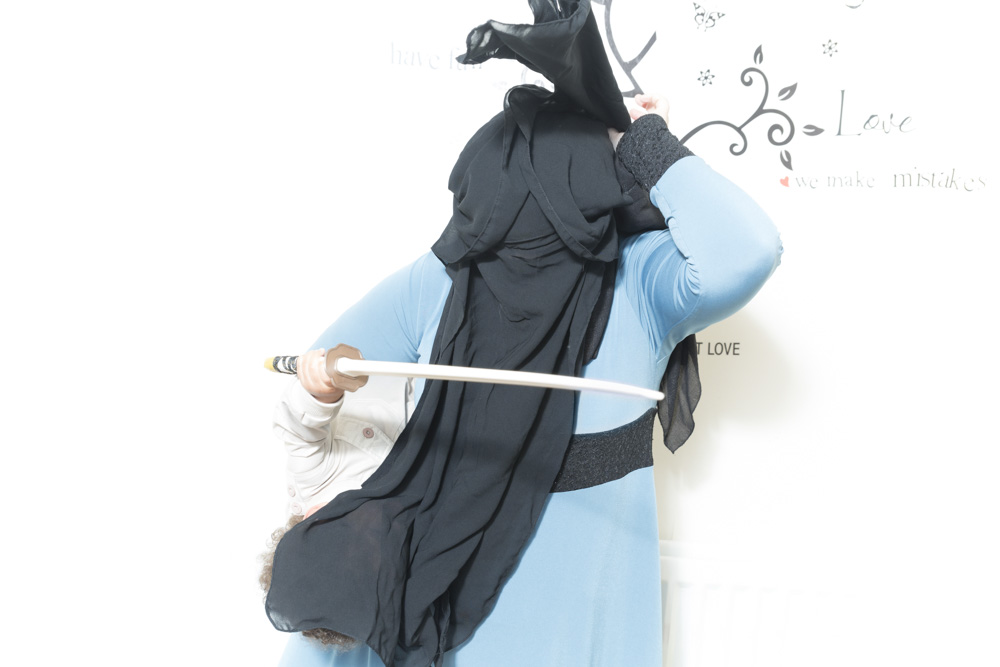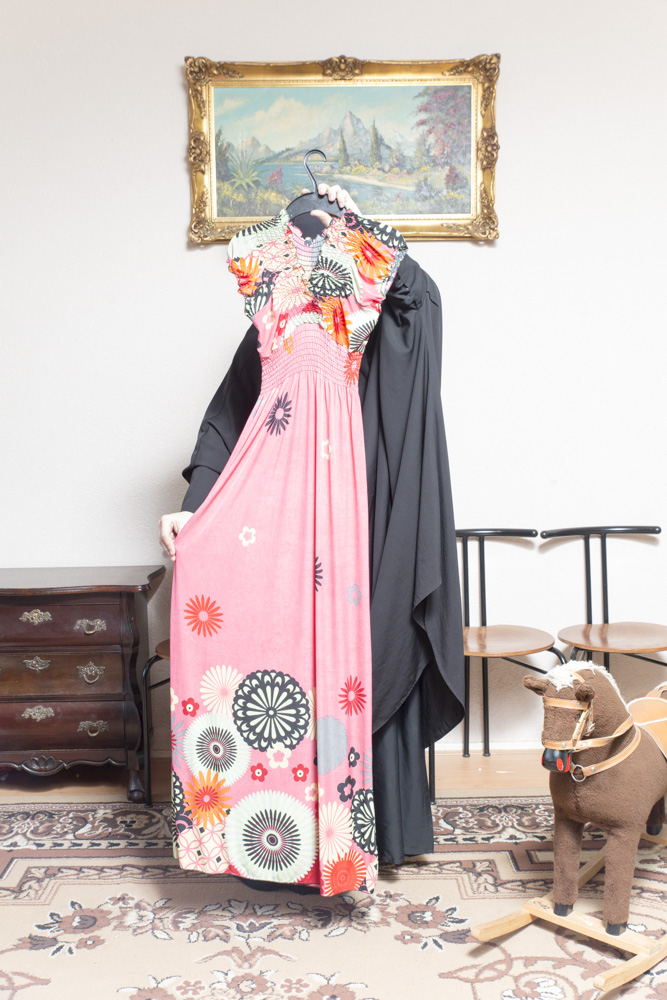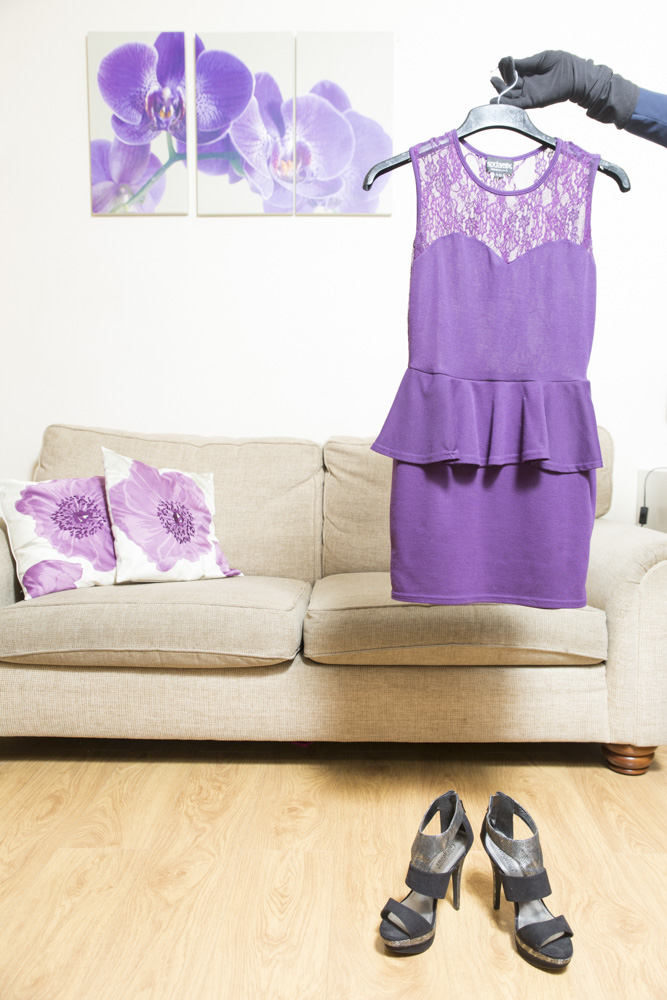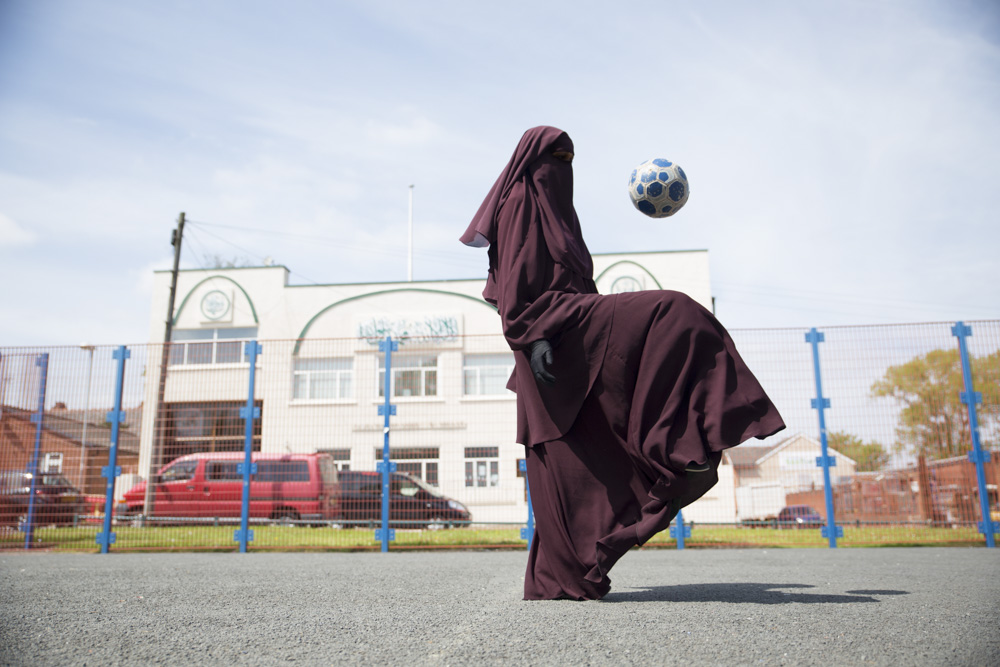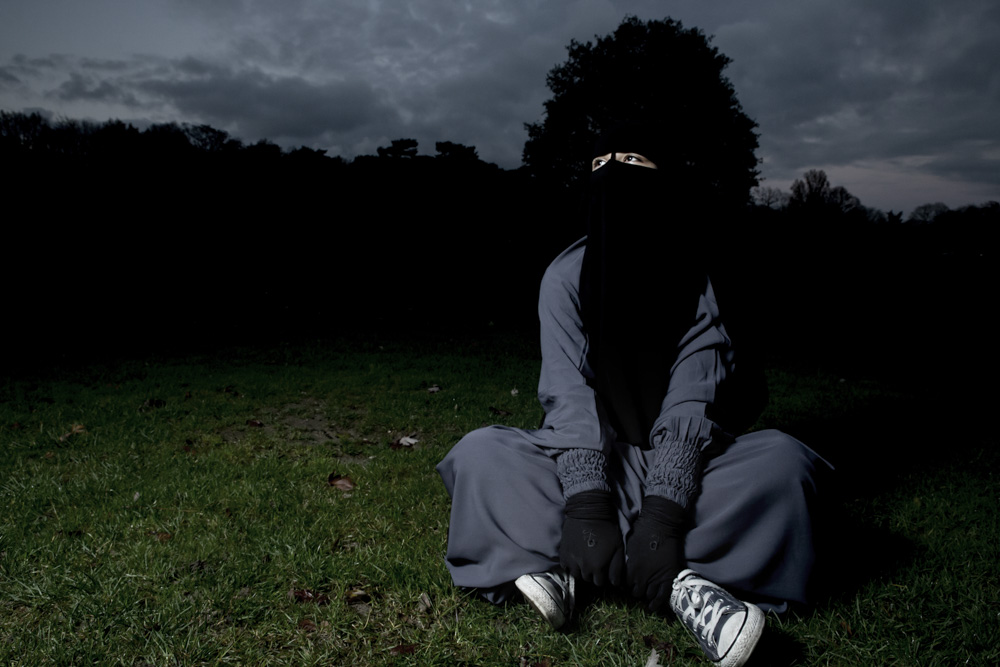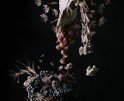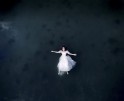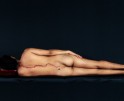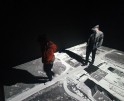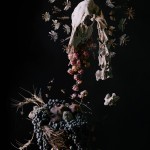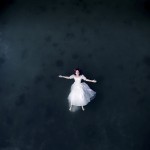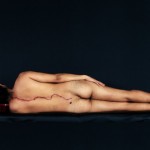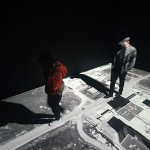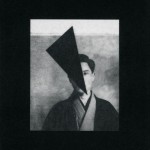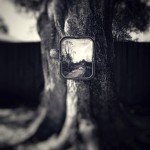Dutch Week: Saskia Aukema
Saskia Aukema describes herself as a story-telling photographer, though she says she could just as well be called an image-making writer, hence her interest in slow journalism projects. I first met her when she was pitching her latest book “Veiled: too busy being awesome”. That book is the culmination of a three years project where she photographed Western women who choose to wear the niqab. I was straight away intrigued by the imagery which seemed at odds with the stereotype. I have seen my share of Dutch projects that I would describe as documentary cataloguing – possibly epitomized by Hans Eijkelboom’s “The Street”. What drew me to Saskia’s work is that she did more than to build an archive – her photographs show so much humanity even though all her subjects are almost indistinguishable visually. At the back of her book (which truly has a fantastic design, and manages to effortlessly include quotes from interviews, social media excerpts, statistics…), there are also family pictures of these women as (often blond) little girls, sitting with Santa or feeding the swans by the canal. With Aukema’s work, you can not help but be curious about the stories behind each image.
An interview with Saskia follows. You can buy Aukema’s book “Veiled” here.
Saskia Aukema is a Dutch documentary photographer and copywriter. After studying Language and Literature at Leiden University in the 1990s, she embarked on a course at the University of Applied Photography in Amsterdam, where she graduated with distinction in 2013. She won the first price at the Silver Camera competition in the portraits category 2016 (the main Dutch price for photojournalism) and the jury prize of the International Photo festival Leiden 2018. She also was a nominee at the SO2015 Awards for creative photography and selected as one of the New Dutch Photography Talents 2017. The book ‘Veiled – Too Busy Being Awesome’, designed by SYB, was published (in English) late 2017 by Lecturis.
Veiled – western women who choose to wear niqab
It’s one of the most controversial garments in the western world: the niqab, a veil that covers the entire face apart from the eyes. Laws banning the garment have already been introduced in several countries, and niqabi women who are still allowed to wear it meet a lot of hostility on the streets. Who are the women who choose to wear this piece of cloth, despite all the controversy? What do they find funny, beautiful? What is femininity to them? Would they differ much from me: a non-believing woman?
Driven by this curiosity I spent three years in the search for niqabi women. I photographed them the way I got to know them. Not as the ‘black box’ many people take them for, but as colourful individuals, for instance showing the garments they prefer to wear at home with their families. Gradually I also discovered how much these pictures told about myself. They reveal what had surprised me, and therefore undeniably, what my expectations had been. –Saskia Aukema
Many people see the niqab as a tool of oppression imposed on women by men, and one that seems out of place in western society today. Even within the Muslim community at large, it is seen as a symbol of fundamentalism – it’s a relatively rare interpretation of what “modesty”(hijab) should be. Your project is called “Veiled: western women who choose to wear the niqab”. Can you elaborate more on the boundary conditions of 1) western and 2) choose?
Choose is a very important word. The book is called “Veiled – too busy being awesome” so that it’s very clear from the start what it’s about. It was for me really about the women who purposely choose this, often against the will of their fathers, or husbands. Most these men were scared that the women would be abused, like spit on in the streets; but also of what people would think of them, because most assume they are the ones imposing the niqab on the women, and people look angrily at them “He’s the big bad guy, he’s forcing her”. There was even one man who started to look at his wife in a different light, in a negative light – and she actually stopped wearing the niqab to keep their relationship in balance. Cause all the assumptions that people usually make, he had those too; he started to find her less attractive in ways, too extreme.
Western – I wanted to show that it wasn’t about women in Afghanistan or something like that, and it also put extra emphasis on the choice part. Many were Dutch converts. These women wanted to do “extra well”. I photographed women of different nationalities, in the Netherlands and in the UK, but they all started wearing the niqab while living in the West. Actually I did photograph one woman from Pakistan who moved to Holland and already wore the niqab, but that was really the exception. A few women were born into Muslim families, and they discovered more about Islam, and the niqab, and in a way they felt a bit like a convert, because they had to learn new things. Some of them used to be fashionistas in tight clothes, and then started to wear the head scarf and then a niqab.
Did they have one common reason to wear the Niqab, or did that vary a lot?
I found that very interesting – obviously the common reason is Islam. This is an interpretation of the Koran. Everybody just about agrees that you should cover your hair, but it’s not spelled out in there, it’s a broad behavioural interpretation. As for the niqab, most women don’t think it’s mandatory, but it’s a little extra. What they often say is that you kinda keep track of points. Some things are really mandatory, like praying every day, Ramadan etc. So the niqab is just one way to be a bit closer to Paradise. Some women also described how, after a while in religion, your devotion can go a little duller, just like when you’re in love and passion starts to fade, and wearing a niqab can bring that back. “Check out what I do, it’s so special and quite hard” and it can give them a boost.
You’re a photographer specialized in slow journalism. But I don’t think this work is neutral. I see a lot of humour for instance. I also read that you purposely almost overlit your photographs because you didn’t want people to have automatic dark associations. So was there a point where you decided you were going to challenge assumptions in the way you depict them? Or did this just organically evolve, purely coming from the women you photographed?
Humour – that’s good. When I started the project, if you googled “niqab”, you only saw long lens photos from women at the market from a distance, where clearly the photographer didn’t dare ask for permission. Or in the other kind of photographs, there were women with beautifully made up eyes, some kind of “sexy niqab”. I didn’t want either of that, especially not the long lens kind, because you still wouldn’t know anything about the women who wear it. So I wanted to go further than that, but I wasn’t sure of what I would encounter. I knew that I wouldn’t be neutral, because you can never be neutral of course. But I wanted to be open minded and weigh in all sides and wanted to highlight things that might not often be in the news. But if I had been really shocked by something, if the women all had said weird stuff, like “IS is a great idea” or something like that, then I would have stopped the project I think. I have also left some things out, because as my book designer said “that’s what people know already”. And so in the end I only showed what surprised me, what I hadn’t expected. Even very little things, like how do you eat the first time that you wear a niqab?, or how a woman who wears a niqab will get on her bike to go to the biological market across town to buy milk. So in ways it has become selective, and maybe a bit more positive. But not that much more. It basically shifted my mindset from “This is only this” to “This is also this”.
I heard you mention, when you spoke at the International Photo Festival Leiden (as you were this year’s winner!), being absolutely shocked when you realized what these women face every day when they go outside – incredibly harsh verbal abuse, physical attacks even. How do those Muslim women experience and deal the hatred that is so clearly displayed against them because of a garment and the religion attached to it?
For themselves, they can really handle it well because they believe that they are doing the right thing for their faith, so if someone makes a comment, then they think “whatever, I’m not going to let someone like you stop me”. But there are also women who walk with small children and that’s another story. There’s this bubble of negativity and awful comments and people don’t care that there are small children around. And that’s terrible for that child, to hear that your mother is being called names, of worse indeed. I spoke with a woman who was beaten up, in front of her children, her niqab was torn away from her face. What the hell are people thinking? That you are against the niqab, or a veil, I can understand. That it goes against what you believe, or it’s not what you’re used to, I get that. But that you act this way? It’s unbelievable. People associate violence with the niqab – and then you do this – so you use violence to protest violence? It’s so weird.
In a way it makes no sense to me – if they are forced to wear a niqab, then they are the victims; if they are choosing to wear it, then who are we to criticize? But ok. Have your own views on the niqab – not the women who wear it – changed?
I’ve literally asked this to one of these women “would it be possible that it’s in fact not your free will? Many people say about you that you’ve been brainwashed. What do you think?” And she said, quite rightly so I think, that “It’s possible, but then maybe we’re all brainwashed.”. We all live in our bubble, we all have ideas about what is good and bad, what clothing is appropriate to wear… There are other extremes, like goth, or very naked, or very boring! Personally I wouldn’t recommend people to wear a niqab, because it leads to a lot of problems. From time to time I still find it a bit scary actually. But should we forbid everything that shocks or surprises us, things we are not comfortable looking at? Should we not be civilized people in a civilized country and be able to say “I don’t feel great seeing it, but we should let it be”?
You went in curious about how different or similar these women would be to you but mention actually learning more about yourself – how did that happen?
It’s more that I learned about my own prejudices or biases. For instance, I thought I was pretty open minded. Then I’m surprised when a woman shows me this pair of badass jeans she owns. Then I realized, of course, why wouldn’t she own badass jeans? I had to do a double take. Preconceived ideas help us survive, we take in the world by cutting it into small boxes to process it, otherwise it would be chaos in our heads. So it can help us, but you have to be aware as well that it can go too far. And so everything that you don’t really know, you are unnuanced about. That’s the reason photography is so great. It makes you discover the world. I’m not trying to say with the book “Niqab is okay” or “All Muslims are fun”, but try to look past your own boundaries, try to stay curious about each other. Some things will be great to discover, some will not. Not that I always feel like that either, but it’s a good thing to do.
People often ask if you ever have worn a Niqab, to try it, and you have – how did you find that?
A lot of people ask me that indeed. I was with a woman who sometimes wore the niqab, she was experimenting, and she said “Do you want to wear it together? I think you should also experience that so you can understand things better”, and I agreed. So we went to Rotterdam, and walked in the city centre, it was very interesting. After a while you forget you’re wearing it and then you see your reflection in a store window… You’re confronted in the eyes of strangers. As a person you are no different than your usual self just because you wear it, but a lot of people turn their heads away when they see you. You can see they feel uncomfortable. Or maybe it’s politeness.
What is the question that people most often ask you about these women?
“Do they have to wear that from their husband?”, “Is it not too hot in there?”, “How do they recognize each other?” That’s actually a good one – they recognize the way they walk, the children, the shoes, handbags, height… Once during Eid I followed the wrong person, and another time I also saw a child follow the wrong mother!
Is there a particular story that sticks out for you that you’d like to share?
Something that strikes me is actually the number of women in this project that no longer wear the niqab. That comes from the aggression and from a Dutch law that has been in the making [and has been passed since this interview was done]. In the beginning I had trouble finding a woman who used to wear the niqab but had stopped – it was hard to find someone because they feel a bit of shame about it. But then later, one after the other stopped wearing it.
Have you witnessed changes in attitude from individuals as a response to your work?
Yes. The best compliment I got was via facebook, someone who after seeing an exhibit said “Now I would just greet those women on the streets”. It’s really good, that people are kind to each other, or no longer afraid of each other, that’s a pretty big step.
What’s next?
I’m done with this. Islam remains interesting to me, I think because I know more and more about it and so I notice more interesting things about it too. But I’m busy right now with a big project – a complicated one – about the Eruv in the Amsterdam area.
Posts on Lenscratch may not be reproduced without the permission of the Lenscratch staff and the photographer.
Recommended
-
Tara Sellios: Ask Now the BeastsApril 6th, 2024
-
ALEXIS MARTINO: The Collapsing Panorama April 4th, 2024
-
Emilio Rojas: On Gloria Anzaldúa’s Borderlands: The New MestizaMarch 30th, 2024
-
Artists of Türkiye: Eren SulamaciMarch 27th, 2024
-
Love and Loss in the Cosmos: Valeria Sestua In Conversation with Vicente IsaíasMarch 19th, 2024

